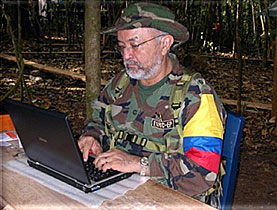
Swiss offer best hope for Colombian hostages

Switzerland provides the best prospects for obtaining the peaceful release of hostages held by rebels in Colombia, an observer has said.
Since a failed European humanitarian mission in April, there has been no progress over the plight of hostages including Ingrid Betancourt, a French-Colombian dual national captured by the Revolutionary Armed Forces of Colombia (Farc).
The stalemate became even worse after Interpol authenticated documents found on the computer of Paul Reyes, the Farc guerrilla leader killed during a raid by the Colombian army on a Farc camp inside Ecuador on March 1.
According to the documents, Venezuela and Ecuador provide substantial support to the Farc.
The evidence was flaunted by Colombian President Alvaro Uribe but was vehemently rejected by the presidents of the two countries accused, Hugo Chavez and Rafael Correa, both of whom are involved in efforts to try and free Colombian hostages.
Swiss mediation
Switzerland has been engaged in securing the release of hostages in the Latin American country for several years. Despite the deadlocked situation there is hope that the Swiss can make a difference.
“Switzerland, as part of the facilitator group of three countries together with France and Spain, maintains discreet channels of communication to try to secure a humanitarian solution to the hostage situation,” Rémy Friedmann, the Swiss diplomat in charge of the situation, confirmed from Colombia.
“Currently the only active parties are Switzerland, France and Spain, the church and two Colombian facilitators who were officially put in charge by the Colombian government to establish contact with Farc.”
France, for its part, is trying to re-establish contact with the Farc.
“France will not overlook any avenue for renewing lines of dialogue with Farc over the question of the release of Ingrid Betancourt,” French Minister François Fillion told the media during the Latin American-European Union Summit in Lima on Friday.
But Juan Gabrial Uribe, director of the daily newspaper El Nuevo, who himself negotiated between the Farc and the Colombian government under the Andrés Pastrana presidency (1998-2002), puts most faith in the Swiss mediation route.
“Switzerland is the only mediator that has not shown any bias towards Farc,” he wrote in an editorial on May 2 entitled “Humanitarian agreement: all roads lead to Switzerland”.
He added that the Colombian government knows that Swiss involvement implies that negotiations will be centred on the hostages. Success will not mean that the Farc will be removed from the European Union list of terrorist organisations – an option put forward by France in April ahead of its upcoming EU presidency.
Swiss mediators have nine years’ solid experience in the Colombian hostages case and have built up relationships of trust with both the Farc and the Columbian presidency.
“The Swiss respect the views of the different countries involved and act with transparency, keeping both the Farc and President Uribe informed of their actions,” said the investigative journalist Juan Gasparini, the Geneva correspondent for several Latin American newspapers.
Major obstacle
The hardest task lies ahead: reconciling the two parties’ positions with a view to reaching a humanitarian agreement.
While stressing that respect for international humanitarian law means that the hostage-takers must free the hostages, Friedmann said there was still one major obstacle ahead.
“Farc wants two Colombian municipalities (Florida and Pradera) to be demilitarized in order for them to negotiate their terms for an agreement there. The Colombian government made counterproposals concerning a meeting place but does not accept the principle of demilitarisation.”
“In December 2005 the three mediator countries developed a proposal to set up a security system with international observers. This mechanism was supported by the government but not the Farc.”
He added: “We are therefore going to continue to work towards a solution.”
The outcome could lead to the exchange of 39 “political” hostages, including Betancourt, for 500 guerrillas imprisoned by Colombia.
swissinfo, Frédéric Burnard in Geneva
Colombia is one of Switzerland’s peace and human rights priority countries, with an annual budget of around SFr2 million ($1.9 million) and another SFr4 million in humanitarian aid from the Swiss Agency for Development and Cooperation.
Since 2002, Switzerland has worked towards facilitating a mechanism for dialogue between the Farc guerrillas and the Colombian government to achieve a humanitarian agreement aimed at freeing hostages.
Since the end of 2005, Switzerland, Norway and Spain have taken part in peace talks between the Colombian government and the country’s other main guerrilla force, the National Liberation Army.
Together with the International Centre of Transitional Justice in New York, Switzerland supports efforts by the Colombian state and organisations representing victims to introduce mechanisms for the proper recognition of crimes that have been committed and justice for victims.
Bern has supported the Swiss for Peace in Colombia programme since the end of 2001, in partnership with a group of Swiss non-governmental organisations, which aims to strengthen civil society’s initiatives for peace.

In compliance with the JTI standards
More: SWI swissinfo.ch certified by the Journalism Trust Initiative





























You can find an overview of ongoing debates with our journalists here . Please join us!
If you want to start a conversation about a topic raised in this article or want to report factual errors, email us at english@swissinfo.ch.